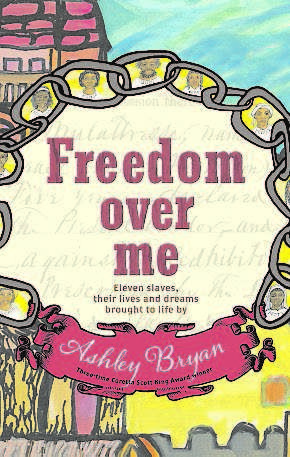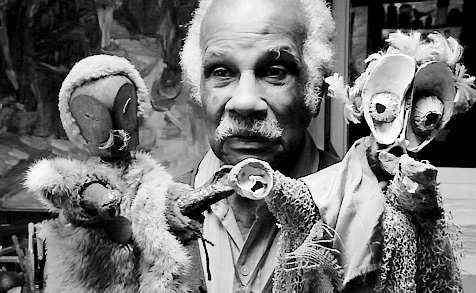











Ashley Bryan, a renowned Maine artist, author and storyteller who created over 70 children’s books, has died at age 98.
Bryan, who lived for years on Little Cranberry Island, was also a World War II veteran and was known for lifting up the voices and experiences of African Americans through his work. He died peacefully Friday in Texas, where he had been staying recently with a relative.
“He was so well loved and was very inspiring,” said Bryan’s nephew Sandy Campbell of New York City. “In many ways he really challenged people to look at themselves and be creative and be a blessing to humanity, which he was.”
Bryan turned 98 last July and was still reciting poetry, especially Shakespeare’s sonnets, up to his last days, according to the Ashley Bryan Center, which was created in 2013 to preserve and celebrate his work.
“Ashley was passionate about making poetry come alive and educating young and old of every ethnic background about the legacy of African and African American culture,” the center said in a message on its website. “Visitors from all over the world have made the pilgrimage to his magical home on Little Cranberry Island/Islesford off the coast of Maine. They were rewarded with gummy bears and hugs; everyone was ‘family.’”
Bryan, the second oldest of six children, was born in Harlem in 1923 to Antiguan immigrant parents. He began pursuing art as a teenager and had an impressive portfolio, but was turned away from several art programs when he went to submit his artwork in person.
“He was told, ‘This is a wonderful portfolio, but why would we waste a place on a colored person?’” said Nick Clark, a longtime friend and founding director of the Ashley Bryan Center. “This was 1939. It was a different world then.”
Bryan’s high school teachers encouraged him to apply to The Cooper Union in New York, because of its blind admissions process, and he was accepted and enrolled.
Then, in 1942, Bryan was drafted to fight in World War II. He landed at Omaha Beach during the D-Day invasion, and completed his Cooper Union degree after the war.
He studied art around the world and went on to a long teaching career at Queen’s College, Philadelphia College of Art, Lafayette College and Dartmouth College.
Bryan first visited Maine in 1946, when he came to attend the Skowhegan School of Painting and Sculpture. It was then that he fell in love with Little Cranberry Island, which he called home for six decades and where he moved full time in 1988 after retiring from Dartmouth.
A child of the Great Depression, Bryan let nothing go to waste and used every bit of space in his house. “If we accused him of being a hoarder, he was at least a very neat and tidy hoarder,” said Clark, who said Bryan filled his shelves with books and toys he collected from his travels around the world.
Bryan was also fond of collecting debris and sea glass from the island and would use them to make puppets and window panels. In 2017, the Storyteller Pavilion opened next to Bryan’s home in Islesford.
The pavilion, which houses some of Bryan’s puppets and window panels, is meant to be a refuge and meditation center for the public and will remain open.
A celebrated author and illustrator, Bryan was the recipient of the Coretta Scott King-Virginia Hamilton Lifetime Achievement Award, the Laura Ingalls Wilder Award, several Coretta Scott King Awards, a Newbery Honor and countless other awards and recognitions.
His books were a force for bringing people of color and issues of racial diversity into children’s literature and for introducing children of all backgrounds to African American poetry and folktales. Some of his best-known titles are “Freedom Over Me,” a story about slavery that Bryan told using original slave auction and plantation estate documents, and “Beautiful Blackbird,” a tale about appreciating one’s heritage and finding beauty within.
In 2019, Bryan also published “Infinite Hope: A Black Artist’s Journey from World War II to Peace,” about his experience as a Black soldier and how his pursuit of art sustained him and gave him hope.
Daniel Minter, a friend and the co-founder of the Indigo Arts Alliance, a Portland-based nonprofit that seeks to amplify the voices of and grow connections between artists of color, said Bryan’s latest book was an example of how the artist could take even the worst situation – war – and find something to be hopeful about.
“One of the main things I admired about him was every day was an opportunity, an opportunity for creation and for observation,” said Minter, who first got to know Bryan when he moved to Maine 19 years ago. “Anything on that day Ashley could turn into a plus, something to be joyful for.”
Two years ago, Gov. Janet Mills declared July 13, 2020, as Ashley Frederick Bryan Day in honor of his 97th birthday and in recognition of his contributions to the state and in illuminating the African American experience.
“I am deeply saddened to learn of Ashley’s passing,”
Mills said in a statement Saturday. “He was a wonderful, happy man with a deep, rich history, a great imagination and a beautiful, childlike soul.”
Bryan is survived by his brother, Ernest, and several nieces and nephews. Campbell, one of his nephews, said about two years ago that his family made the decision it would be too difficult for Bryan to stay on Little Cranberry Island in the winter.
Recently he had been staying with his niece, Campbell’s cousin, in the Houston area of Texas, though he returned to Maine for a few months last summer.
“Everything about Maine he loved and it was reflected in so many ways in his art,” Campbell said. He said his uncle had maintained good health up until the last few weeks and that the family believes he simply died of old age.
Most of the archive of Bryan’s work, which includes drawings he made as a child, letters and correspondence to friends, and preliminary and finished material from a number of books, was gifted to the Kislak Center for Special Collections at the University of Pennsylvania in 2019.
The Ashley Bryan Center is working with Maine’s major museums, including the Farnsworth Art Museum in Rockland, the Portland Museum of Art and the museums at Colby, Bates and Bowdoin colleges to ensure Bryan’s work is also represented in their collections.
The Farnsworth in September announced Bryan as the recipient of the 2022 Maine in America Award, which recognizes outstanding contributions to Maine’s role in American art and is the museum’s highest honor.
“He was a remarkable man,” said Christopher Brownawell, director of the Farnsworth. “He was a gentle spirit but also full of life.
It’s unfortunate he passed but at the same time he lived a very rich life.”
Brownawell said the museum is planning to open an exhibit of Bryan’s work this summer in conjunction with the award. “We’re excited about that,”
Brownawell said. “We lost a real friend today, but I think it will be an opportunity to celebrate and continue his legacy.”
Rachel Ohm — 207-791-6388 rohm@pressherald.com Twitter: @rachel_ohm

